Geneva-bound director sings CDC praises
Marc Rivers shares how he found the Institute of Directors Company Directors’ Course a valuable experience.

With the summer holidays comes time to relax and reflect, rather than focussing on immediate concerns (other than what time to fire up the barbecue, of course).
If you’re like me, you will have a list of books you may have started, or have been meaning to read but did not find the time. Below are some that I believe will provide good brain food for directors on holiday. Plus a couple a couple of podcasts – a great way to expand your mind while also pottering about, cooking up a storm, or sunbathing.
Have a great holiday break.
Kirsten Patterson CMInstD
Converge: A Futurist’s Insights into the Potential of our World as Technology and Humanity Collide by Dr Catherine Ball
You can’t embrace technology if you don’t know about it. This introduction to modern technology, including AI, looks at the ways in which it is already impacting manufacturing, food production, healthcare and more.
Ball describes herself as a “scientific futurist” and her perspective is that the future is already here – we just haven’t noticed yet.
This is an optimistic approach to tech with a focus on its potential to deliver benefits, rather than dire warnings of a mechanised future.
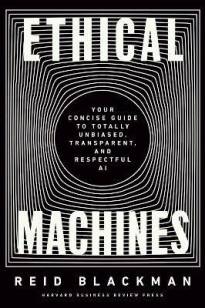
Ethical Machines: Your Concise Guide to Totally Unbiased, Transparent, and Respectful AI by Reid Blackman
Sticking with tech, Reid Blackman’s Ethical Machines is essentially a book about risk management. AI is touted to improve efficiency and productivity through automated decision making at scale, so if the AI goes off-piste then the mistake will also be at scale.
He discusses three major human risk areas that could all be magnified – in terms of impact – by the use of AI. Privacy will be a familiar concern to boards. Bias may also have come up around the board table, but it is potentially of a different magnitude if it is built into your operations. “Explainability”, the challenge of explaining why AI makes the decisions it does, is perhaps new, but closely related to our traditional concept of transparency.
With his focus on the ethical use of technology, I wonder what Blackman would say about the kerfuffle at OpenAI?
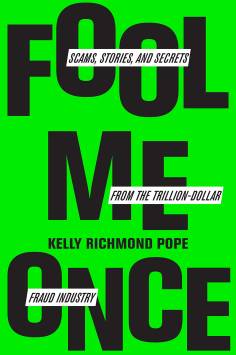
Fool Me Once: Scams, Stories, and Secrets from the Trillion-Dollar Fraud Industry by Kelly Richmond Pope
Are some people truly as gullible as they (we) appear? Probably. And are other as deceitful as they appear? Undoubtedly. Kelly Richmond Pope looks at fraud from both sides of that equation, exploring what the fraudsters were thinking and why their victims “cooperated” in the fraudulent enterprise.
The Theranos and Elizabeth Holmes story is instructive here. Holmes not only fooled investors and the public, she took her excited and willing board along for the ride, too. That’s something all directors should consider as we are not immune to emotional responses.
Pope is also the writer/director of the film All the Queen’s Horses, about a treasurer and comptroller of Dixon city in the US, who pilfered US$50 million from the tax base and set herself up as a horse breeder. Another example of professionals – in this case auditors and bankers – being taken along for the ride. Perhaps one for the accountants among us to seek out?
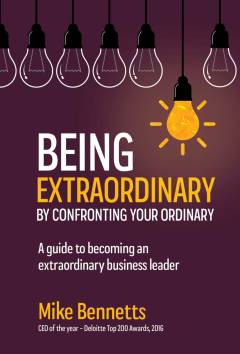
Being Extraordinary By Confronting Your Ordinary – A guide to becoming an extraordinary business leader by Mike Bennetts
Mike Bennetts was named CEO of the Year in the 2016 Deloitte Top 200 for his leadership of Z Energy. One of the interesting observations he brings from his management background, which is very applicable to directors, is to stress the importance of context.
Bennetts reveals discussions at Z over sustainability, and how the leadership found it easy to talk in terms of the “given” context. That is, the context of what has happened in the past and what was happening right now, all around them.
The tricky bit was to discuss it in what he calls “generated” context. That is taking what you know and extrapolating on it, looking to the future, essentially. This is right in the board’s wheelhouse, and one of the ways Bennett argues leaders can become extraordinary.
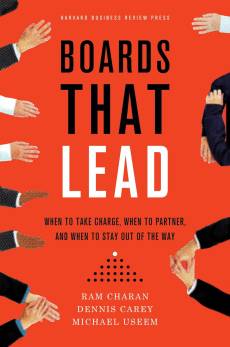
Boards That Lead: When to Take Charge, When to Partner, and When to Stay Out of the Way by Ram Charan, Dennis Carey and Michael Useem
This trio argue that boards are taking a more active role in decisions that were once the provenance of the CEO. This, they say, requires a judicious balancing act on the part of the board – too much influence and you risk meddling in day-to-day operations.
Their solution is to reimagine what governance is, in terms of the theoretical separation of governance and management. Leadership, in their proposed model, is a joint responsibility of board and management.
With a shared background encompassing firms including Boeing, Apple, Ford and Lenovo, the authors bring a wealth of practical experience to the table. And they acknowledge that this new model is not without its pitfalls. But the upshot is that with a clear idea of organisational purpose, the right CEO and directors in place, and a strong focus on ethics and risk, this reimagination of governance could be a useful concept in the modern business world.
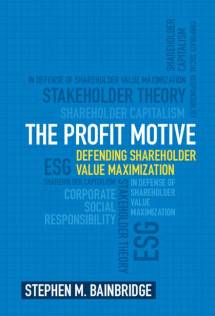
The Profit Motive: Defending Shareholder Value Maximization by Stephen M Bainbridge
Law Professor Stephen M Bainbridge is sceptical of the US Business Roundtable’s 2019 embrace of stakeholder capitalism. He thinks it’s a front and that most directors simply chase profits, even while publically embracing environmental, social and governance (ESG) ideas.
This is a good thing, he says, because corporations exist, and should only exist, to make money for shareholders.
The Profit Motive spans law, history and economic theory to deliver what Bainbridge describes as a “full-throated defence” of shareholder capitalism. But a major component of his position, as is true also with advocates of ESG governance theories, is political as much as rooted in governance or economics. Will this book convince those who subscribe to a more nuanced version of the role of a board? Read it and see.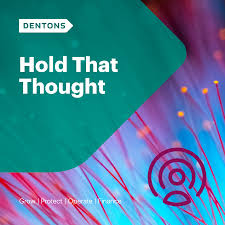
Podcast: Hold that Thought produced by Dentons: Local business leaders and global experts discusses issues of the day that are affecting New Zealand businesses.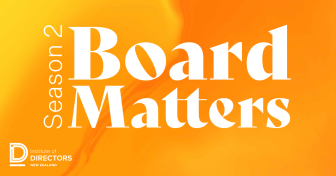
Board Matters series two produced by the IoD: New Zealand directors share their knowledge and advice on specific governance challenges from conflict of interests, to construction and art, to the laid-back character of Kiwi directors.